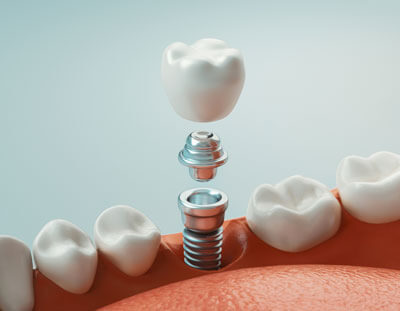Dental Implants in Hervey Bay

More than just affecting your appearance, missing teeth can change the way you eat, speak, and feel. Dental implants offer a natural-looking, long-term option by replacing the entire tooth structure from root to crown. Placed securely in the jawbone, implants support everyday functions like chewing and smiling with ease.
Designed to blend in with your existing teeth, implants also help preserve your jaw’s shape. Many people find them a comfortable, reliable way to restore their smile and confidence.
NEW PATIENTS
What Is a Dental Implant?
A dental implant is a small post typically made from titanium or zirconia – that’s placed in your jawbone where a tooth is missing. Over time, it fuses with the bone, creating a sturdy base for your new tooth.
Once healed, an abutment is added, which connects the post to a custom crown, bridge, or denture. Together, these parts work as a full tooth replacement – from the root up – designed to feel secure and function like your natural teeth.
What’s the Process Like?
Getting a dental implant happens in several stages over a few months. While timing varies, here’s what you can generally expect:
Consultation and Planning
We’ll assess your oral health, take digital images, and discuss whether implants are right for you. If needed, bone grafting may be recommended.
Implant Placement
The post is gently placed into your jawbone. Most people experience only mild discomfort afterwards. A healing period of a few months allows the post to bond with the bone.
Fitting the Restoration
Once healing is complete, we’ll attach your custom crown, bridge, or denture using the abutment piece.
You’ll be supported every step of the way to ensure everything heals and fits as expected.
Post Procedure Care for Dental Implants
Proper care after your dental implant procedure is essential for healing, integration, and long-term success. While discomfort is typically minimal, following these guidelines will ensure the best outcome:
Immediately After Surgery
- Rest: Avoid strenuous activity for 24-48 hours to minimise swelling and promote healing. Keep your head elevated while resting.
- Bleeding Management: Slight bleeding is normal. Bite gently on the provided gauze for 30-60 minutes, replacing it as needed. If bleeding persists beyond 24 hours, contact us.
- Pain Relief: Take prescribed pain medication or over-the-counter options (like ibuprofen) as directed. Apply an ice pack to your cheek in 15-minute intervals to reduce swelling for the first day.
Oral Hygiene
- Day 1: Avoid brushing near the implant site. Instead, rinse gently with warm salt water (1 tsp salt in 8 oz water) 2-3 times daily to keep the area clean.
- After 24 Hours: Resume brushing your other teeth carefully, avoiding the surgical site for a few days. We may recommend an antimicrobial mouthwash to prevent infection.
- Long-Term: Once healed, brush and floss around your implant daily, just like natural teeth, to maintain gum health and implant stability.
Dietary Guidelines
- First 48 Hours: Stick to soft, cool foods like yogurt, mashed potatoes, or smoothies. Avoid hot, spicy, or crunchy items that could irritate the site.
- Weeks 1-2: Gradually introduce semi-soft foods (e.g., scrambled eggs, pasta) as comfort allows. Chew on the opposite side of your mouth.
- After Healing: Enjoy a normal diet, but avoid excessive force on the implant (e.g., biting hard candies) to protect it long-term.
Activity Restrictions
Refrain from smoking or using straws for at least two weeks, as suction can disrupt the healing clot. Avoid alcohol during the initial recovery phase, as it may interfere with medications or healing.
Follow-Up Care
Attend your scheduled follow-up appointments (typically within 1-2 weeks) so we can monitor healing and ensure the implant integrates with your jawbone. Full integration may take 3-6 months, after which we’ll place your permanent crown.
Watch for warning signs like persistent pain, swelling, or implant looseness—if these occur, call us immediately.
Tips for Success
Stay hydrated to aid recovery.
Be patient—minor discomfort or swelling should subside within a week. Your new implant will soon feel like a natural part of your smile!
By following these steps, you’ll protect your investment and enjoy a strong, functional tooth replacement for years to come. Have questions? Our team is here to support you every step of the way.
This expanded section provides actionable advice, addresses patient concerns, and reinforces your expertise.

Which Implant Option Is Right for You?
Implants are highly versatile and can be tailored to your needs:
- Single-tooth replacements
- Bridges or dentures supported by multiple implants
- Full-arch options like All-on-4
These solutions offer a secure, natural-feeling alternative to removable dentures – and help with speaking, eating, and smiling more comfortably.
Am I a Good Candidate?
You may be an excellent candidate for dental implants if you have healthy gums and enough bone to support the post. Even if you’ve experienced bone loss, options like grafting can help. We’ll walk you through what’s possible.
What About Cost and Care?
Costs vary depending on how many implants you need and any additional treatments. We accept most private health funds and offer flexible payment options to help make care more accessible.
Frequently Asked Questions
Will dental implants match my other teeth?
What if I’ve been missing a tooth for a while?
Book a Consultation
Take the first step towards a stronger, more self-assured smile. Contact Dentist in Hervey Bay today to schedule a consultation with our dental team and explore your implant options.
CONTACT US
Any invasive or surgical procedure may carry risks. Before moving forward, it is recommended that you seek a second opinion from an appropriately licensed medical professional.

